Young adults are beings in evolution, in search of self and identity; beings who are constantly growing and changing, morphing from the condition of childhood to that of adulthood. —Michael Cart, “The Value of Young Adult Literature”
It is hard to convey the experience of young adulthood in just a few words. The above statement from author Michael Cart, which emphasizes the becoming-ness of young adulthood, comes close. Similar to Cart, the Child Development Institute highlights the transitional nature of young adults poised between childhood and “the goal of becoming independently functioning adults.” Given teenagers’ major task of becoming, it is no surprise that a pervasive theme in young adult literature is learning and the transfer of knowledge, particularly, in the context of this website, between teens and older generations.
What are teens learning, and how are they growing? Robert J. Havinghurst’s concept of the eight developmental tasks youth experience help to concretize our understanding of the challenges they face. According to Havinghurst, teens are developing more mature social skills; going through physical changes; asserting emotional independence; exploring careers; developing personal ideologies and ethics; learning about gender roles, sex, marriage, and parenthood; and establishing membership in a larger community (Breitlinks.com).
More than that, teens may absorb profound lessons about themselves, society, and the world around them from their peers as well as from surrounding adults. As much as they are capable of absorbing valuable teachings, young adults can also open the eyes of others, especially adults. As represented in YA literature, the theme of learning and knowledge transfer goes both ways between youth and adults, and is the most prevalent of the themes we have chosen to focus on.
Literature on the Theme
The books reviewed here are representative of the theme of Learning, Knowledge and Wisdom; this is not a comprehensive list. Novels are listed alphabetically by authors’ last names.
*
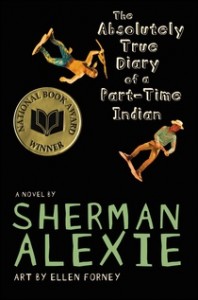 The Absolutely True Diary of a Part-Time Indian, by Sherman Alexie
The Absolutely True Diary of a Part-Time Indian, by Sherman Alexie
Little, Brown, 2007; 240 pages
Sherman Alexie’s first YA novel, The Absolutely True Diary of a Part-Time Indian, is the story of teenaged Junior, who is determined to improve his life by leaving his Spokane reservation to attend school, where he finds life difficult as the only Indian.
Junior’s grandmother, or as he calls her, Grandmother Spirit, gratefully shares her wisdom with Junior, from personal advice to life lessons, and is more than happy to do so. Many of their discussion are reminiscent of oral storytelling tradition, in which Grandmother Spirit tells Junior his stories, her stories, and the stories of their family, passing down wisdom and knowledge from generations past.
*
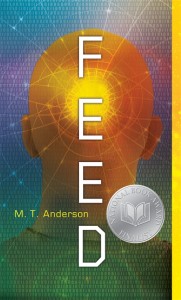 Feed, by M.T. Anderson
Feed, by M.T. Anderson
Candlewick Press, 2002; 308 pages
M.T. Anderson’s dystopian novel, Feed, is set in the not-too-distant future, where teen Titus and his ‘units’ maneuver a strictly capitalist America of lifeless earth, vast toxic oceans, genetically modified existence, and mindless consumerism, in which they are granted the ultimate freedom to consume at will. As it so often does, the freedom to consume comes at a high cost: individual privacy.
Titus and Violet’s relationships with Violet’s father are negative, but still result in the sharing of knowledge, and inspiration to learn. As Titus pressures his friend Violet to conform to the ideals of the new generation, his relationship with her father grows increasingly tenuous. Violet’s father attempts to resist the feed by preserving proper language, literature, and education, and consistently mocks Titus for his ignorance. Although he does so in a demeaning manner, Violet’s father ultimately succeeds in helping Titus to understand the danger their society faces if the knowledge of older generations is lost.
*
 Forever…, by Judy Blume
Forever…, by Judy Blume
Simon Pulse, 1975; 192 pages
Forever… details a young woman’s journey of discovery as she becomes sexually active and explores emotions, activities, and responsibilities related to her sexuality.
Katherine’s grandmother becomes a source of non-judgmental love and wisdom, carefully guiding her to make safe and responsible choices. Rather than admonishing Katherine or regaling her with wild or cautionary tales, the grandmother encourages her to visit a clinic and to explore the options for birth control (AIDS and STIs were not yet a concern). She even sends Katherine a package of educational pamphlets so she has all the facts to make decisions that are right for her.
*
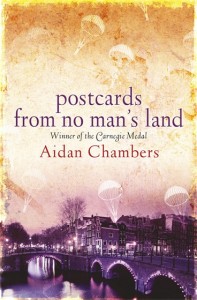 Postcards from No Man’s Land, by Aidan Chambers
Postcards from No Man’s Land, by Aidan Chambers
Red Fox, 1999; 336 pages
The narrative of Postcards from No Man’s Land is divided between the present-day voice of Jacob, a young man visiting the Netherlands on behalf of his grandmother, and the memoirs of Geertrui, the elderly woman he is there to visit. Geertrui remembers the days she knew Jacob’s grandfather and namesake in his last days during the trials and tribulations of World War II.
After some rough misadventures, including being mugged and chasing the culprit through many miles of a foreign city, Jacob drops exhausted in a doorway of a house, poor shelter from the rain. Alma, the elderly woman who lives in the house befriends him, a stranger, and takes care of Jacob with great generosity before helping him on his way. Later, Jacob returns to thank Alma and ends up availing himself of her listening ear as he pours out the troubles of his heart on a number of issues. Most serious are revelations that Geertrui had an affair with his grandfather during the war (resulting in a child)—news that Jacob wrestles over passing onto his grandmother—and that Geertrui is now terminally ill and has chosen to undergo euthanasia within days. Jacob seeks not only comfort from Alma, but also her wisdom and advice.
*
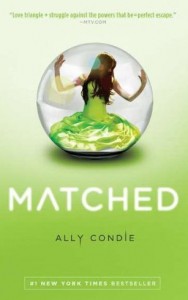 Matched, by Ally Condie
Matched, by Ally Condie
Speak, 2010; 400 pages
In this dystopian novel by Ally Condie, the state controls all aspects of its citizens’ lives: whom they marry, where they live, what they do for employment, what they do for leisure, what they eat, what what they read, what they possess, and even how long they live. Young Cassia starts to question everything about this world when she notices her beloved grandfather’s small acts of rebellion: he gives her a forbidden poem and asks his son, Cassia’s father, to secretly destroy his DNA so it cannot be preserved after his death.
As Cassia gradually becomes disenchanted with her society, the example of her grandfather’s small resistances return to her mind and influences her actions.
*
 Annie On My Mind, by Nancy Garden
Annie On My Mind, by Nancy Garden
McGraw-Hill Ryerson, 1982; 234 pages
High school senior Eliza “Liza” Winthrop, president of the student council and aspiring architect, struggles to both accept and reconcile her love for Annie with the stigma that revealing her homosexuality will spark. In English class, Ms. Widmer, one of the best teachers at her privileged but financially troubled private school in Brooklyn, introduces Liza’s class to a poem by William Ernest Henley. Liza silently invokes Henley’s words when she is forced to defend herself and a classmate for breaking a school rule with which she disagrees: “Out of the night that covers me, / Black as the Pit from pole to pole, / I thank whatever gods may be / For my unconquerable soul” (34).
Both Ms. Widmer and Ms. Stevenson, the art teacher, encourage Liza to stand up for herself and develop her critical and independent thinking. But when Liza makes an irrevocable mistake that changes all of their lives, Liza’s teachers inadvertently show her an even greater lesson in love, forgiveness and self-acceptance.
*
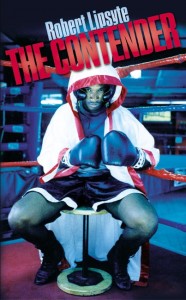 The Contender, by Robert Lipsyte
The Contender, by Robert Lipsyte
Harper & Row, 1967; 182 pages
This fast-paced novel follows the adventures of Alfred Brooks, a seventeen-year-old high school dropout from Harlem, as he avoids gangs, trains to be a boxer, tests his mettle, and finds out when it is time to retire. Along the way, Alfred makes and loses friends, faces difficult life decisions, and learns how to dream for the future.
Mr. Donatelli, the boxing trainer, and his assistant, Bud Martin, take Alfred under their wing with a seemingly personal interest, more than they would for just another young boxer wannabe. They nurture the promise they see in him, sharing their wisdom and knowledge, not allowing him to rush things, and helping him recognize when it is time to quit.
*
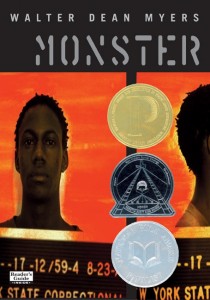 Monster, by Walter Dean Myers
Monster, by Walter Dean Myers
Harper Tempest, 1999; 281 pages
Steve Harmon, a sixteen-year-old boy on trial for his alleged participation in the murder of a shopkeeper, has decided to record the events as a film script, blocking the scenes like he learned at school from Mr. Sawicki. Although Mr. Sawicki makes only the briefest appearance as a character witness during the trial, it is evident from his testimony (234-237) that he and Steve have gotten to know each other quite well over the last three years that Steve has been in the film club. The support and mentorship that Mr. Sawicki provides has an obvious impact on Steve, and the sophistication of the movie script proves the relationship is also one in which Mr. Sawicki shares his knowledge and skills.
*
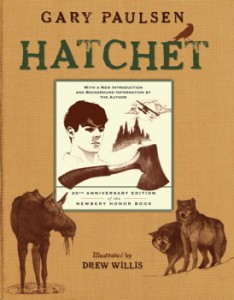 Hatchet, by Gary Paulsen
Hatchet, by Gary Paulsen
Simon & Schuster, 1987; 186 pages
Hatchet is the story of thirteen-year-old Brian Robeson, whose pilot dies of a heart attack mid-flight, leaving him to fly and land the plane. After crashing, Brian must survive alone in the Canadian wilderness until his rescue 54 days later, with nothing but his wits, memories, and his new hatchet. Although we do not meet him, Brian’s former English teacher, Mr. Perpich, played an instrumental role in his survival, for it was memories of lessons Mr. Perpich had drilled into his students that helps Brian to keep going, to get moving, to stay positive, to survive no matter what (46). These memories also challenge Brian to stay motivated, to look at his resources differently, to realize what he actually has, to remember that “‘You are your most valuable asset’” (47). It is because of the encouragement, mentorship, and training of his former teacher that Brian is able to keep his presence of mind and do what is necessary to survive.
*
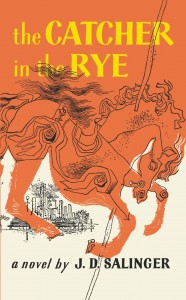 The Catcher in the Rye, by J.D. Salinger
The Catcher in the Rye, by J.D. Salinger
Back Bay Books, 1951; 277 pages
This hotly contested book details the misadventures of sixteen-year-old Holden Caulfield after he is expelled from yet another school. Exhibiting the usual teenage angst and lack of direction, Holden spends a few days left to his own devices, indulging himself before returning home to disappoint his parents with the news.
Before leaving the school, Holden stops in to see his very elderly and ill history professor, Mr. Spencer. It is obvious that Mr. Spencer cares about his students, even Holden, and wants to see him set on the right path in life. Holden himself picks up on the concern, even though he resents being lectured. Mr. Spencer persists in questioning him about the quality of his efforts in his studies, and where he is going in life. It is important that Holden knows there are people who care about him and want the best for him, even though the advice of his teacher seems to fall on deaf ears.
*
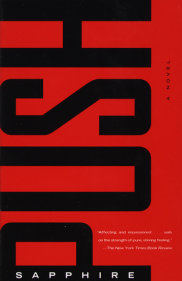
Alfred A. Knopf, 2009; 140 pages
Push is the appalling yet ultimately uplifting story of Claireece Precious Jones, who, among other abuses to which she is subjected, at the age of 16 is pregnant with her second child by her father. As a consequence, starting from second grade when she is first abused by her father, Precious becomes so disengaged with her public school that she remains functionally illiterate at the age of 16. When she is transferred to an alternative school, Precious meets Ms. Rain, her new teacher. The relationship between Precious and Ms. Rain is mutually enriching and pivotal to the story. Ms. Rain not only helps Precious become literate, she encourages Precious to take up poetry and discover the works of authors such as Alice Walker, Audre Lord and Langston Hughes—vastly expanding Precious’ world and the opportunities available to her. Moreover, Ms. Rain helps Precious to accept and respect others’ homosexuality. Initially, Precious is dismayed when she discovers that Ms. Rain is a lesbian. However, Precious comes to realize that homosexuals are not the ones who have hurt her, signaling a growing maturity and self-awareness. Reciprocally, Ms. Rain learns from her students, including Precious, about the violent hardships they face and their remarkable struggles to turn their lives around.
*
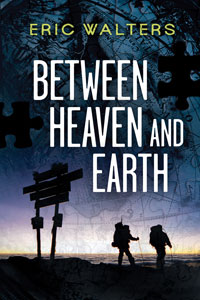 Between Heaven and Earth, by Eric Walters
Between Heaven and Earth, by Eric Walters
Orca Book Publishers, 2012; 245 pages
Seventeen-year-old DJ is the eldest of his deceased grandfather’s grandsons. When the will is read, the family discovers there is a seventh grandson no one else knew about, and each grandson is given a separate mission to accomplish. Eric is sent to climb Mount Kilimanjaro in Tanzania and scatter his grandfather’s ashes from the top. Starting off with full confidence, DJ soon finds that success will require all of his strength and endurance, and that he must learn to rely on others. Tricked into demanding Sarah, the teenage daughter of his guide, be hired as one of the porters, DJ finds himself isolated from the disapproving locals, not only because it is Sarah’s first time on the mountain and she has not yet proven herself, but mainly because she is a woman. DJ is left only with Sarah and Doris, an elderly woman, for traveling companions.
Doris has all the wisdom her years suggest, yet she also has a gentle gracefulness about the way she imparts knowledge and gives advice to those around her. On the journey up the mountain and back down again, DJ and Doris learn from each other, support one another, and realize that neither could have succeeded without the other.
*
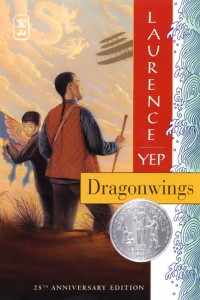 Dragonwings, by Laurence Yep
Dragonwings, by Laurence Yep
HarperCollins, 1975; 248 pages
Dragonwings tells the adventures of Moon Shadow, a young Tang Chinese boy who emigrates from China to San Francisco at the turn of the 20th century. He is met by his father, Windrider, whom he has never met, as well as uncles and other relatives. He befriends Mrs. Whitlaw, the elderly white landlady, and her young niece, Robin, and helps his father build a flying machine despite the odds against them. Together they face racism, family opposition, earthquake, fire, robbery, and poverty.
Moon Shadow and Mrs. Whitlaw seem fascinated by each other, and it is mutual respect that allows each to teach the other about their customs and traditions—many of which are related to their common obsession with dragons.
*
Other themes: Unconditional Love // Legacy // Collective Memory // Mortality
